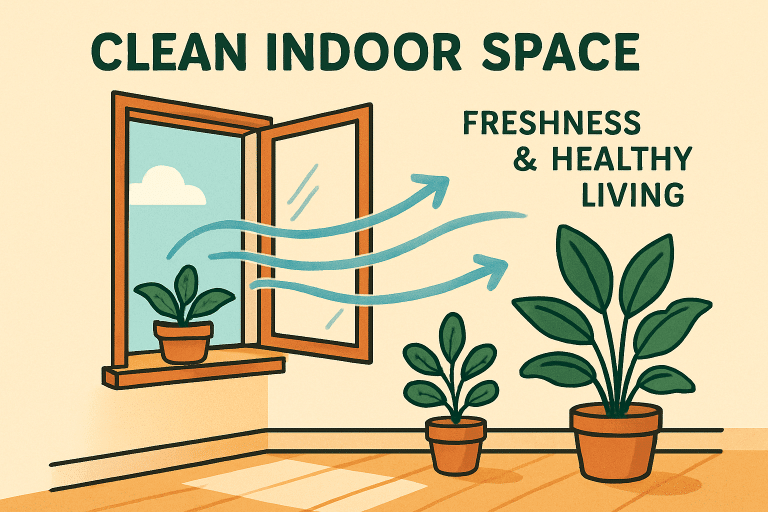The Surprising Link Between Clean Airflow and Better Health
Key Takeaways
- Clean airflow is crucial not only for respiratory health but also for energy, skin, mental well-being, and even gut health.
- Simple steps, such as routine indoor air duct cleaning and proper ventilation, can significantly enhance the quality of your indoor environment.
- Recent research reveals that air quality affects mental outlook and the gut-lung connection, making air quality a multifaceted issue for whole-body wellness.
Breathing in clean air does more than keep your space feeling fresh—it has a direct impact on your health on multiple levels. From your lungs to your mind, the benefits of clean, unobstructed airflow can be dramatic. The impacts range from lowering your risk of respiratory infections to enhancing your mood and energy levels. Regular indoor air duct cleaning is a proactive measure to maintain healthy airflow and promote overall well-being at home or in the workplace.
Many people are surprised to learn that the air inside our homes can be more polluted than the air outdoors, making efforts to purify the air we breathe essential for our comfort and long-term health. Proper filtration and regular maintenance practices can limit exposure to dust, bacteria, pollen, and mold that linger unseen inside air ducts and HVAC systems.
Respiratory Health: The First Line of Defense
Our respiratory system is our most direct shield against airborne pollutants. When we inhale air that’s tainted with dust, mold, pet dander, or bacteria, these particles can trigger symptoms ranging from mild throat irritation to severe asthma attacks. Chronic exposure is associated with higher rates of respiratory infections and other long-term lung diseases, particularly in homes where the air isn’t regularly cleaned and recirculated. For allergy and asthma sufferers, clean airflow means fewer flare-ups and easier breathing, as illustrated by data from the Centers for Disease Control and Prevention.
Fatigue and Cognitive Function: The Hidden Impact
Poor indoor air doesn’t just affect your lungs—it also saps your mental energy. When our bodies constantly have to filter pollutants, it can cause lethargy and ‘brain fog.’ Some airborne contaminants have been shown to prompt inflammation, which may disrupt sleep cycles and leave you tired even after a full night’s rest. High-quality air, rich in clean oxygen, helps maintain sharp mental clarity, better focus, and higher productivity throughout the day. Recent insights from the EPA’s guide on improving your indoor environment suggest that indoor air quality may be linked to enhanced cognitive performance and lower rates of dementia in older adults.
Skin and Eye Health: Beyond the Obvious
The connection between air quality and the health of your skin and eyes is less discussed but equally important. The constant recirculation of dust, mold spores, and dander in the air can lead to itchy eyes, rashes, or inflamed skin—especially for individuals with sensitivities or preexisting skin conditions, such as eczema. Eye irritation, redness, or swelling can also be triggered or worsened by dirty indoor air, making daily comfort harder to achieve in neglected environments.
Indoor Air Quality and Mental Health
Emerging studies suggest a profound connection between the air we breathe indoors and our emotional well-being. High levels of indoor air pollution are linked to increased risk of anxiety, depression, and even chronic stress. Addressing indoor air quality—by adopting practices such as regular filter replacement or smart ventilation—not only strengthens physical health but also supports emotional stability and resilience for every household member. If you or loved ones spend significant time indoors, these improvements can directly boost your quality of life and overall happiness.
The Gut-Lung Connection: A New Frontier
New research is uncovering the surprising ‘gut-lung axis,’ revealing that air quality doesn’t just affect breathing—it plays a significant role in our digestive and immune systems. Pollutants inhaled into the lungs may impact the gut’s microbiome, potentially influencing how the body manages inflammation, allergies, or disease.
This bidirectional communication means improving the air your family breathes can have benefits far beyond what’s traditionally understood, impacting issues as diverse as metabolic health and immune response. To learn more about how air affects the gut, recent findings highlighted by the EPA’s insights on the indoor microbiome offer deeper insight into the science.
Practical Steps to Improve Airflow and Health
Improving the air you breathe each day doesn’t require sweeping renovations—just a handful of practical, easily implemented strategies can help. Consider the following for creating a healthier living or working environment:
- Change HVAC filters regularly, ideally every 1-3 months, to remove accumulated dust and allergens.
- Use portable air purifiers, especially in bedrooms and high-traffic areas, for targeted removal of particles.
- Monitor and adjust humidity levels with dehumidifiers to prevent mold growth.
- Ventilate your home periodically by opening windows or using exhaust fans to allow stale indoor air to escape.
- Schedule annual maintenance and cleaning of air ducts to keep the system running efficiently and prevent mold growth.
Conclusion
Clean airflow is a vital pillar for well-being—touching every aspect of our health from the moment we wake to the moment we rest. By being proactive about air quality, your household can enjoy easier breathing, clearer thinking, healthier skin, and a more positive mood. Take small steps today, such as routine air filter changes and professional air duct cleaning, to make a lasting investment in your long-term health, happiness, and peace of mind.








